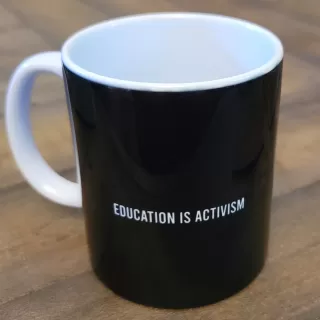As a parting gift before graduation, my PhD student, Sydney Tran, presented me with a mug inscribed with the phrase: “education is activism.” This simple yet profound message serves as a powerful reminder of the impact of my teaching and writing, reassuring me that these efforts are indeed meaningful and sufficient.
Recently, three colleagues approached me, each seeking guidance on how to become advocates and measure their effectiveness. In each conversation, I shared the wisdom of my mug.
I asked Sydney what “education is activism” meant to her. She responded, “I think the teaching of psychology as a whole is inherently activism. After all, we’re teaching students about the many influences on and explanations of human behavior. When we teach about topics such as the psychology of disability, we encourage students to think differently about experiences they may never have questioned before. Maybe they’re like me and didn’t have the language to discuss these topics until now. We provide them with the tools to think critically about their worlds.”
I view this blog as an extension of my classroom and lab, embodying the idea that education is activism by making information about the psychology of disability freely accessible. We publish plain-language summaries of research from my lab, breaking down barriers often created by paywalls and jargon. In our work, we prioritize research conducted by and for people with disabilities, ensuring that our participants and their communities can engage with and learn from our findings.
The Ripple Effect of Advocacy
The impact of my work, even if it reaches just one individual, is enough to keep me motivated. While evidence of effectiveness can be elusive, I occasionally receive messages from readers who express how my writing resonated with them. For example, one person shared how they used my posts to advocate for reasonable accommodations at their workplace.
One of the most rewarding aspects of my work is mentoring my graduate students over five years. Many of my former students, including Sydney, are now educators and researchers dedicated to improving the lives of disabled individuals and advocating for better healthcare.
A tangible illustration of my impact comes from my classroom experiences. On the first day of each new class, I share my personal journey and the reasons behind my pursuit of psychology. I strive to humanize the role of professors, revealing the personal experiences that drive our passion. I explain my own background with Moebius syndrome, a rare neurological condition that causes facial paralysis and limited eye movement. This condition sparked my fascination with social interaction and led me to psychology. Discussing disability in class not only increases representation but also helps to combat disability stigma.
A Long-Term Commitment to Change
Over 15 years, I’ve taught thousands of university students, fostering a campus environment rich in awareness about Moebius syndrome. When I encountered a new freshman with the same condition, I felt a sense of optimism and pride—my college town has become a beacon for Moebius syndrome awareness.
One of the main challenges faced by individuals with Moebius is a lack of public awareness. Misunderstandings can arise from ignorance, leading to assumptions about unfriendliness or intelligence based on facial paralysis. Educating others about Moebius encourages a broader understanding of expressive diversity—the various ways we communicate. Perhaps this new student will face fewer stares and misconceptions than I did.
While direct impacts may be rare, most days, I find myself unsure of how my contributions lead to change. I believe this uncertainty is part of the process. Even if my students perform well on tests and essays, I recognize that they may not retain everything I teach. Yet, I have planted seeds that can flourish in the right conditions. The most powerful activism occurs collectively; I stand on the shoulders of those who came before me.
This blog has reached hundreds of thousands worldwide, potentially sowing seeds of understanding about ableism. The next time someone encounters an inaccessible space or experiences microaggressions, they may begin to question those injustices. I often wonder if I’m doing enough, but each sip of my Irish breakfast tea reminds me that I am contributing my part to the ongoing fight against ableism.











